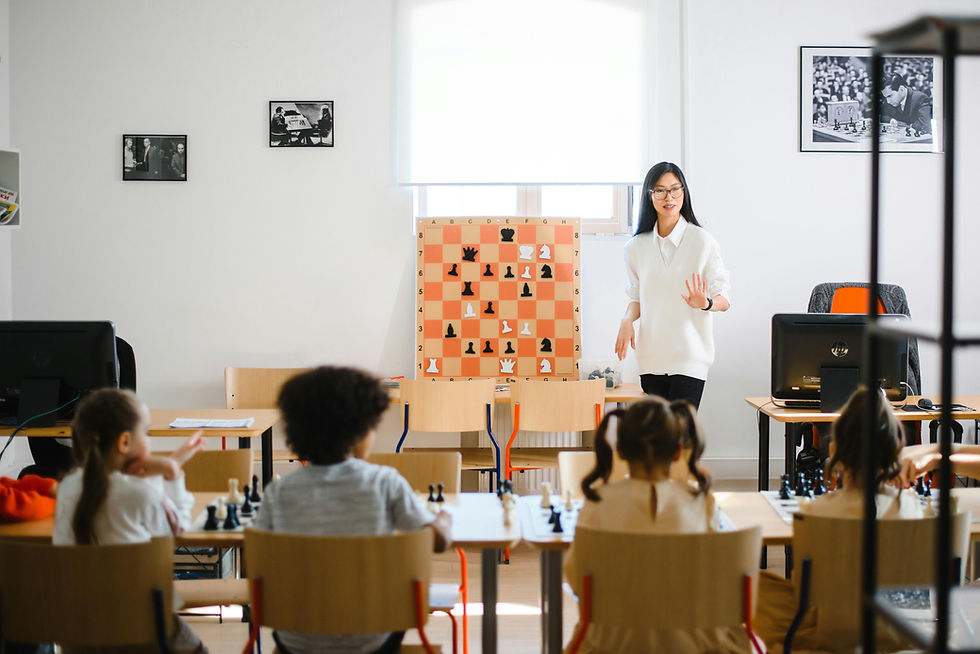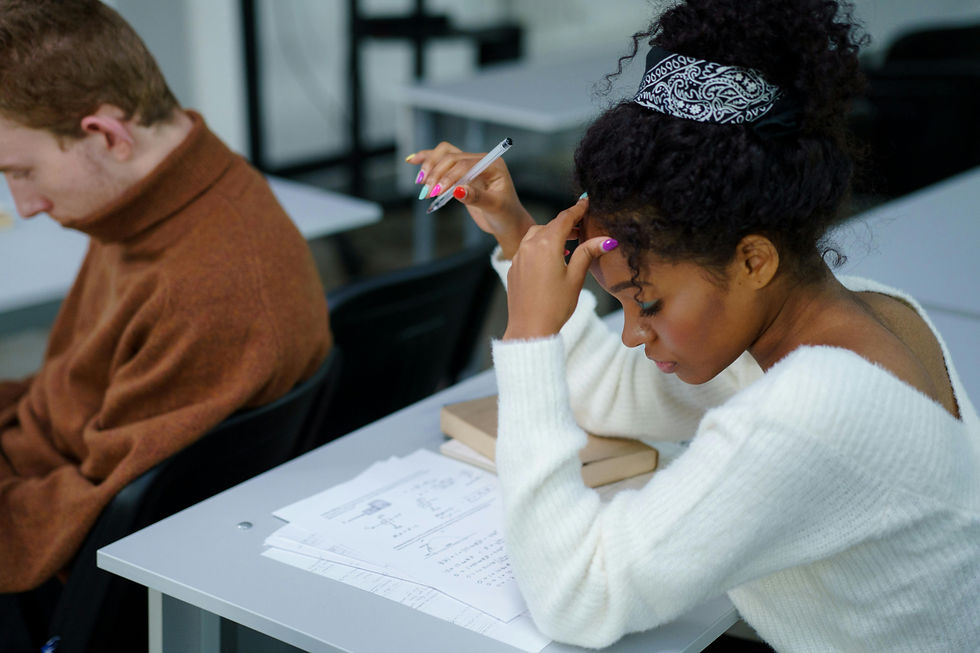Exploring the Human Mind: Engaging Activities for Psychology Substitute Teachers
- Busybee Teachers

- Oct 16, 2025
- 6 min read
For substitute teachers in psychology, finding engaging, educational activities that captivate students can be a challenging task. This article provides a comprehensive guide to a variety of activities that substitute teachers can use to explore the human mind effectively. From internet resources to interactive classroom exercises, these activities are designed to enrich students' understanding of psychology while keeping them actively involved.
Key Takeaways
Utilize internet activities and documentaries to introduce students to brain anatomy and psychology.
Incorporate hands-on lab exercises from high school psychology resources to enhance experiential learning.
Engage students with interactive classroom activities using TOPSS unit plans and thematic units.
Discuss and explore psychological theories through classic experiments and diverse perspectives.
Leverage technology like digital tools and virtual reality to make learning about psychology more dynamic.

Unlocking the Secrets of the Brain
Internet Activities on Brain Anatomy
We've curated a series of interactive online activities that delve into the intricate anatomy of the brain. These activities are designed to make the complex structures understandable and engaging for students, helping them visualize the different parts and functions of the brain.
Bio-Psychology: Exploring Layers & Lobes
In our exploration of bio-psychology, we focus on the layers and lobes of the brain. This segment allows students to understand how each section of the brain contributes to various psychological functions. It's fascinating to see how the physical structure of the brain impacts behavior and cognitive processes.
Documentary Analysis: Psychology Secrets of the Human Brain
We encourage substitute teachers to utilize documentaries like The Secret Life of the Brain. This documentary provides a comprehensive view of how the brain develops from infancy through old age. Engaging students with this material can spark their imagination and deepen their understanding of developmental psychology.
Diving into Lab Exercises
Hands-on Laboratory Tasks
We always strive to make our lab sessions as interactive as possible. Starting with hands-on tasks is a great way to engage students right from the get-go. Whether it's dissecting brain models or conducting simple behavioral experiments, the key is to keep everyone involved and learning actively.
Engaging in Society for the Teaching of Psychology Exercises
Incorporating exercises from the Society for the Teaching of Psychology can significantly enhance our lesson plans. These activities are not only well-structured but also deeply informative, covering a wide range of topics that are essential for any budding psychologist.
Exploring High School Psychology Lab Exercises
High school psychology labs offer a unique opportunity to explore psychological concepts in a practical setting. By utilizing lab exercises specifically designed for high school students, we can provide a more tailored and impactful learning experience. This approach helps in making complex psychological theories more accessible and easier to understand.
Interactive Classroom Activities for Psychology
Search and Implement TOPSS Unit Plans
We've found that using TOPSS (Teachers of Psychology in Secondary Schools) unit plans can be a game-changer for substitute teachers. These comprehensive plans are designed to ensure that even on short notice, you can deliver high-quality, structured lessons. They cover a wide range of topics, making it easy to find something that fits your class's current focus.
Utilizing Webquests and Worksheets
Incorporating webquests into your teaching strategy allows students to explore psychological concepts at their own pace. Worksheets complement these quests by providing structured guidance, ensuring that students engage deeply with the material.
Engaging with Thematic Unit Plans
Thematic unit plans offer a cohesive learning experience, where every activity and lesson is interconnected. This approach not only enhances learning but also keeps students engaged and curious about the subject matter. By focusing on thematic units, we ensure that learning is both deep and broad, covering various aspects of psychology in an integrated manner.

Understanding Psychological Theories
Study Classic Psychology Experiments
We often dive into the rich history of psychology by studying classic experiments. This not only helps us appreciate the evolution of psychological theories but also sharpens our analytical skills. For instance, exploring the famous Milgram experiment or the Stanford prison study can provide profound insights into human behavior and ethics in research.
Discuss Experiments with Peers
Engaging in discussions with peers about various psychological experiments fosters a deeper understanding and encourages diverse viewpoints. It's a fantastic way to see how different psychological perspectives can be interpreted and applied in various scenarios.
Explore Diverse Psychological Perspectives
The field of psychology is vast and studying different perspectives such as cognitive, behavioral, humanistic, and psychodynamic allows us to appreciate the complexity of human behavior. This exploration is crucial in developing a well-rounded understanding of psychological theories.
Incorporating Technology in Psychology Teaching
Using Digital Tools for Brain Studies
We've embraced the use of digital tools to enhance our understanding of the brain. Interactive software and apps not only make learning more engaging but also allow us to visualize complex brain structures in a way that textbooks simply can't match. These tools are essential in bringing abstract concepts to life.
Interactive Online Learning Platforms
Online platforms have revolutionized the way we teach psychology. By incorporating interactive elements, these platforms facilitate a more dynamic learning environment. They also provide access to a wealth of resources that can be tailored to different learning styles.
Virtual Reality in Psychological Education
Imagine stepping into the shoes of a neuroscientist or experiencing the effects of psychological phenomena firsthand. Virtual reality (VR) offers these unique educational experiences, making it a powerful tool in psychological education. It's not just about reading or watching; it's about experiencing and understanding on a whole new level.
Cultivating Critical Thinking
Activities to Enhance Analytical Skills
We understand the importance of sharpening analytical skills in our students. By engaging them in activities that challenge their reasoning and logic, we foster a deeper understanding of psychological concepts. Activities like debates, case studies, and critical reviews can significantly enhance their analytical prowess.
Debates and Discussions on Psychological Topics
Debates and discussions are not just about expressing opinions; they're about defending them with evidence. This approach not only cultivates critical thinking but also improves communication skills. We encourage interactive learning experiences where students can explore different perspectives and develop a well-rounded understanding of topics.
Problem Solving in Psychology Contexts
Problem-solving is essential in psychology as it equips students with the ability to apply theoretical knowledge in practical scenarios. We focus on real-life problems that require thoughtful analysis and creative solutions, preparing students for professional challenges they might face in the future.
Exploring Emotional Intelligence
Emotional intelligence (EI) is crucial for both personal and professional growth. As substitute teachers, we have a unique opportunity to cultivate this in our students through various engaging activities.
Activities on Understanding Emotions
We start by helping students identify and understand their emotions. This involves exercises that are not only science-based but also interactive, ensuring that students can relate them to real-life scenarios. For instance, using role-plays or real-life situations can make these exercises more relatable and effective.
Role-Playing to Navigate Emotional Scenarios
Role-playing is a powerful tool in teaching EI. It allows students to experience and react to different emotional scenarios in a controlled environment, which can be incredibly beneficial for their emotional growth. This method helps in enhancing their empathy and understanding of complex emotional dynamics.
Assessments to Measure Emotional Intelligence
Finally, we assess the progress and understanding of EI in students through structured assessments. These can range from simple questionnaires to detailed interactive activities that measure various aspects of emotional intelligence. The goal is to provide feedback and insights that students can use to improve their emotional skills.
Wrapping Up
As we conclude our exploration of engaging activities for psychology substitute teachers, it's clear that the wealth of resources available can make teaching this complex subject both exciting and impactful. From interactive lab exercises to comprehensive unit plans, there's something to spark curiosity and deepen understanding for every student. Remember, the key to a successful substitute teaching experience in psychology is to utilize these resources to create an interactive, thought-provoking classroom environment. Whether you're guiding students through classic experiments or exploring the intricate workings of the human brain, these tools are designed to support and enhance your teaching journey.
Frequently Asked Questions
What are some engaging internet activities for learning about brain anatomy?
You can explore 3D anatomy worksheets and interactive internet activities that introduce parts of the brain, which are highly engaging and informative for students.
How can substitute teachers utilize the TOPSS unit lesson plans?
Substitute teachers can quickly search and implement over 100 activities from the TOPSS unit lesson plans, covering a variety of topics such as memory, learning, and the biological basis of behavior.
What lab exercises are available for high school psychology teachers?
High school psychology teachers can use laboratory exercises from the Society for the Teaching of Psychology, which include hands-on tasks originally printed in the APA Division 2 e-book 'Promoting Psychological Science'.
Are there any resources for teaching psychological theories through documentaries?
Yes, there are worksheets and movie guides available that cover documentaries like 'Psychology Secrets of the Human Brain,' which can be used to teach various psychological theories and concepts.
How can technology enhance the teaching of psychology?
Technology can be incorporated through digital tools for brain studies, interactive online learning platforms, and virtual reality setups to provide immersive educational experiences in psychological education.
What activities help in understanding emotional intelligence?
Activities such as role-playing emotional scenarios, assessments to measure emotional intelligence, and discussions on understanding emotions are effective for exploring emotional intelligence in educational settings.
.png)

